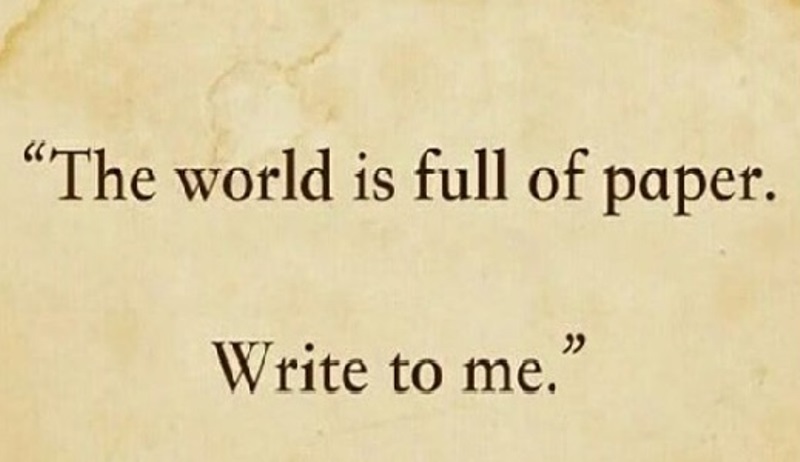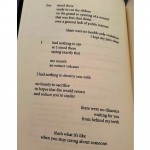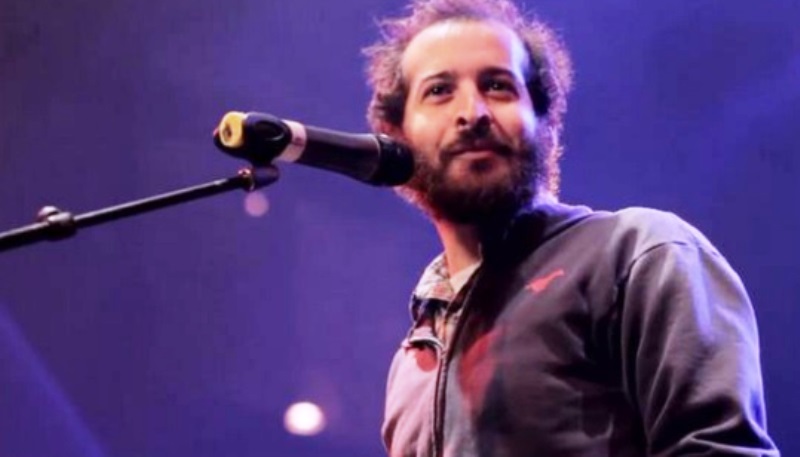According to the Poetry Foundation,
Agha Shahid Ali was born in New Delhi, India in 1949. He grew up in Kashmir, the son of a distinguished and highly educated family in Srinagar. He attended the University of Kashmir, the University of Delhi and, upon arriving in the United States in 1975, Pennsylvania State University and the University of Arizona. Though a Kashmiri Muslim, Ali is best known in the U.S. and identified himself as an American poet writing in English. The recipient of numerous fellowships and awards and a finalist for the National Book Award, he taught at the University of Massachusetts-Amherst, Princeton College and in the MFA program at Warren Wilson College. At the time of his death in 2001, Ali was noted as a poet uniquely able to blend multiple ethnic influences and ideas in both traditional forms and elegant free-verse. His poetry reflects his Hindu, Muslim, and Western heritages. In Contemporary Poets, critic Bruce King remarked that Ali’s poetry swirls around insecurity and “obsessions [with]…memory, death, history, family ancestors, nostalgia for a past he never knew, dreams, Hindu ceremonies, friendships, and self-consciousness about being a poet.”
In today’s post, we will be looking at some of the most remarkable poems by Agha Shahid Ali.
Suggested read: Aubade And Other Tom Sleigh Poems
Best poems by Agha Shahid Ali
- A History of Paisley
You who will find the dark fossils of paisleys
one afternoon on the peaks of Zabarvan –
Trader from an ancient market of the future,
alibi of chronology, that vain
collaborator of time – won’t know that these
are her footprints from the day the world began.
(Oh see, it is still the day the world begins:
and the city rises, holding its remains,
its wooden beams already their own fire’s prophets.)
And you, now touching sky, deaf to her anklets
still echoing in the valley, deaf to men
fleeing from soldiers into dead-end lanes
(Look! Their feet bleed; they leave footprints on the street
which will give up its fabric, at dusk, a carpet) –
you have found-you’ll think- the first teardrop, gem
that was enticed for a mogul diadem
into design…
…three men are discussing, between
sips of tea, undiscovered routes on emerald
seas, ships with almonds, with shawls for Egypt.
It is dusk. The gauze is torn. A weaver kneels,
gathers falling threads. Soon he will stitch the air.
(The Country without a post office, 1997)
- A Pastoral
on the wall the dense ivy of executions
—ZBIGNIEW HERBERT
We shall meet again, in Srinagar,
by the gates of the Villa of Peace,
our hands blossoming into fists
till the soldiers return the keys
and disappear. Again we’ll enter
our last world, the first that vanished
in our absence from the broken city.
We’ll tear our shirts for tourniquets
and bind the open thorns, warm the ivy
into roses. Quick, by the pomegranate—
the bird will say—Humankind can bear
everything. No need to stop the ear
to stories rumored in branches: We’ll hear
our gardener’s voice, the way we did
as children, clear under trees he’d planted:
“It’s true, my death, at the mosque entrance,
in the massacre, when the Call to Prayer
opened the floodgates”—Quick, follow the silence—
“and dawn rushed into everyone’s eyes.”
Will we follow the horned lark, pry
open the back gate into the poplar groves,
go past the search post into the cemetery,
the dust still uneasy on hurried graves
with no names, like all new ones in the city?
“It’s true” (we’ll hear our gardener
again). “That bird is silent all winter.
Its voice returns in spring, a plaintive cry.
That’s when it saw the mountain falcon
rip open, in mid-air, the blue magpie,
then carry it, limp from the talons.”
Pluck the blood: My words will echo thus
at sunset, by the ivy, but to what purpose?
In the drawer of the cedar stand,
white in the verandah, we’ll find letters:
When the post offices died, the mailman
knew we’d return to answer them. Better
if he’d let them speed to death,
blacked out by Autumn’s Press Trust
not like this, taking away our breath,
holding it with love’s anonymous
scripts: “See how your world has cracked.
Why aren’t you here? Where are you? Come back.
Is history deaf there, across the oceans?”
Quick, the bird will say. And we’ll try
the keys, with the first one open the door
into the drawing room. Mirror after mirror,
textiled by dust, will blind us to our return
as we light oil lamps. The glass map of our country,
still on the wall, will tear us to lace—
We’ll go past our ancestors, up the staircase,
holding their wills against our hearts. Their wish
was we return—forever!—and inherit(Quick, the bird
will say) that to which we belong, not like this—
to get news of our death after the world’s.
(for Suvir Kaul)
Suggested read: “You Didn’t Show Up, I Keep Waiting”: Richard Siken Poems To Heal Your Heart
- Ghazal
Feel the patient’s heart
Pounding—oh please, this once—
—JAMES MERRILL
I’ll do what I must if I’m bold in real time.
A refugee, I’ll be paroled in real time.
Cool evidence clawed off like shirts of hell-fire?
A former existence untold in real time …
The one you would choose: Were you led then by him?
What longing, O Yaar, is controlled in real time?
Each syllable sucked under waves of our earth—
The funeral love comes to hold in real time!
They left him alive so that he could be lonely—
The god of small things is not consoled in real time.
Please afterwards empty my pockets of keys—
It’s hell in the city of gold in real time.
God’s angels again are—for Satan!—forlorn.
Salvation was bought but sin sold in real time.
And who is the terrorist, who the victim?
We’ll know if the country is polled in real time.
“Behind a door marked DANGER” are being unwound
the prayers my friend had enscrolled in real time.
The throat of the rearview and sliding down it
the Street of Farewell’s now unrolled in real time.
I heard the incessant dissolving of silk—
I felt my heart growing so old in real time.
Her heart must be ash where her body lies burned.
What hope lets your hands rake the cold in real time?
Now Friend, the Belovèd has stolen your words—
Read slowly: The plot will unfold in real time.
(for Daniel Hall)
- I See Chile In My Rearview Mirror
By dark the world is once again intact,
Or so the mirrors, wiped clean, try to reason. . .
—James Merrill
This dream of water—what does it harbor?
I see Argentina and Paraguay
under a curfew of glass, their colors
breaking, like oil. The night in Uruguay
is black salt. I’m driving toward Utah,
keeping the entire hemisphere in view—
Colombia vermilion, Brazil blue tar,
some countries wiped clean of color: Peru
is titanium white. And always oceans
that hide in mirrors: when beveled edges
arrest tides or this world’s destinations
forsake ships. There’s Sedona, Nogales
far behind. Once I went through a mirror—
from there too the world, so intact, resembled
only itself. When I returned I tore
the skin off the glass. The sea was unsealed
by dark, and I saw ships sink off the coast
of a wounded republic. Now from a blur
of tanks in Santiago, a white horse
gallops, riderless, chased by drunk soldiers
in a jeep; they’re firing into the moon.
And as I keep driving in the desert,
someone is running to catch the last bus, men
hanging on to its sides. And he’s missed it.
He is running again; crescents of steel
fall from the sky. And here the rocks
are under fog, the cedars a temple,
Sedona carved by the wind into gods—
each shadow their worshiper. The siren
empties Santiago; he watches
—from a hush of windows—blindfolded men
blurred in gleaming vans. The horse vanishes
into a dream. I’m passing skeletal
figures carved in 700 B.C.
Whoever deciphers these canyon walls
remains forsaken, alone with history,
no harbor for his dream. And what else will
this mirror now reason, filled with water?
I see Peru without rain, Brazil
without forests—and here in Utah a dagger
of sunlight: it’s splitting—it’s the summer
solstice—the quartz center of a spiral.
Did the Anasazi know the darker
answer also—given now in crystal
by the mirrored continent? The solstice,
but of winter? A beam stabs the window,
diamonds him, a funeral in his eyes.
In the lit stadium of Santiago,
this is the shortest day. He’s taken there.
Those about to die are looking at him,
his eyes the ledger of the disappeared.
What will the mirror try now? I’m driving,
still north, always followed by that country,
its floors ice, its citizens so lovesick
that the ground—sheer glass—of every city
is torn up. They demand the republic
give back, jeweled, their every reflection.
They dig till dawn but find only corpses.
He has returned to this dream for his bones.
The waters darken. The continent vanishes.
- K.L. Saigal
Nostalgic for Baba’s youth,
I make you return
his wasted generation:
I know you felt
it all: the ruined
boys echoed
through you,
switched their sorrow
on the radio:
the needle turned
to your legend.
you always came
with notes of madness,
the wireless
sucked your
drunkenness:
you quietly died,
singing
them to a sleep
of Time
Counting the ruins
of decades,
the boys were left,
caressed
with the air’s
delirium.
Now two generations
late,
you retreat with my sanity,
Death stuck in the throat!
Suggested read: Renascence And Other Poems By Edna Millay
That is all we have on today’s post on the best poems by Agha Shahid Ali. Did you like what you just read? Let us know in the comment section below.
Keep your eyes on this space if you love books and tales they carry in them. If you want to contribute an article, then please feel free to do so.
See you again next time.
Featured image source: Instagram













